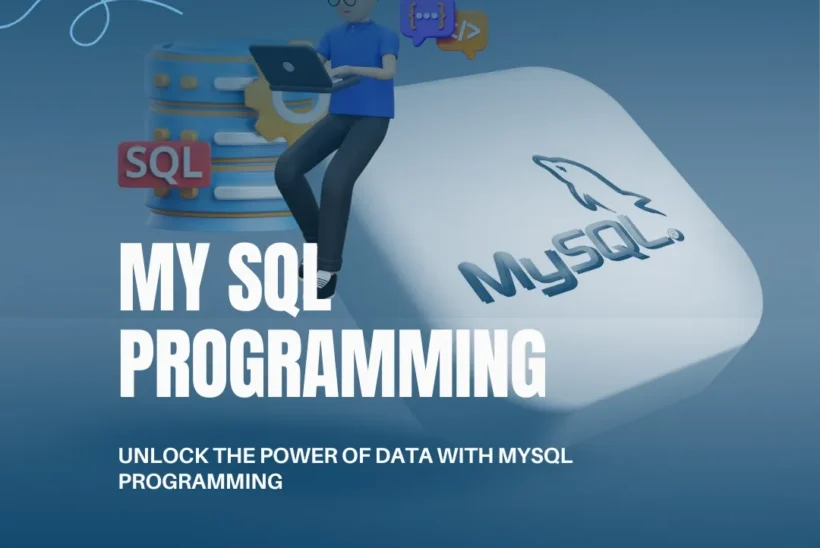Download Course Brochure
What is SQL?
SQL stands for Structured Query Language. SQL is used to communicate with a database. According to ANSI (American National Standards Institute), it is the standard language for relational database management systems.
Introduction
MySQL is a widely used open-source relational database management system that empowers businesses and individuals to store, manage, and manipulate data efficiently. Learning MySQL programming can unlock a world of possibilities, whether you’re a beginner seeking to understand the fundamentals of databases or an experienced programmer aiming to enhance your database management skills. In this article, we will explore the comprehensive curriculum of a MySQL programming course and highlight the key concepts and skills you can gain through the learning journey.
Getting Started with MySQL
Before diving into the intricacies of MySQL programming, it’s essential to set up the environment and familiarize yourself with the tools. The course begins with an introduction to MySQL and guides you through the installation and configuration process. You’ll also become acquainted with MySQL Workbench, a visual database design and administration tool that simplifies your workflow and enhances productivity.
Fundamentals of SQL
Structured Query Language (SQL) serves as the foundation for interacting with databases, and mastering its syntax and commands is crucial for efficient data manipulation. The course delves into the basics of SQL, including creating and manipulating databases, understanding tables and data types, and writing SQL queries to retrieve and filter data. Through hands-on exercises, you’ll gain confidence in writing SQL statements and performing fundamental operations.
Retrieving Data with SELECT Statements
SELECT statements are at the core of retrieving data from MySQL databases. In this section, you’ll learn how to construct SELECT queries to retrieve data from single tables and refine your results using WHERE clauses. Additionally, you’ll explore sorting and ordering techniques to present data in a meaningful way, and discover methods to limit and paginate query results, allowing for efficient data retrieval in real-world scenarios.
Advanced SQL Techniques
To leverage the full power of MySQL, you’ll dive into advanced SQL techniques. One of the most powerful features of MySQL is the ability to work with multiple tables through JOIN operations. You’ll learn how to combine data from multiple tables using various JOIN types and harness the potential of subqueries to tackle complex data retrieval challenges. Furthermore, the course will cover grouping and aggregating data using GROUP BY and HAVING clauses, as well as performing data modification using INSERT, UPDATE, and DELETE statements.
Database Design and Normalization
A well-designed database is essential for efficient data management and scalability. This section of the course focuses on the principles of database design, entity-relationship (ER) diagrams, and normalization techniques. You’ll learn how to structure your databases to eliminate redundancy, ensure data integrity, and establish relationships between tables. By following best practices in database design, you’ll be equipped to create robust and scalable database solutions.
Stored Procedures and Functions
Stored procedures and functions offer modularity and reusability in database programming. The course covers the concepts and implementation of stored procedures and functions in MySQL. You’ll discover how to create and execute stored procedures, allowing for efficient and secure execution of frequently used SQL code. Additionally, you’ll explore the benefits of utilizing functions to encapsulate complex logic and simplify database programming.
Security and Performance Optimization
Securing your database and optimizing performance are critical aspects of database administration. This section of the course will guide you through implementing security measures in MySQL, managing user privileges, and controlling access to data. You’ll also learn about indexing techniques to enhance query performance and minimize response times. Additionally, the course will cover backup and recovery strategies to protect your valuable data.
Advanced Topics in MySQL
To further expand your knowledge, the course delves into advanced topics in MySQL. You’ll explore triggers and events, which allow you to automate actions based on specified database events. Additionally, you’ll learn how to create views for simplified data access and explore advanced indexing techniques to optimize complex queries. The course also covers full-text search capabilities in MySQL, enabling you to perform efficient text-based searches within large datasets. Finally, you’ll delve into handling transactions and managing concurrency to ensure data integrity in multi-user environments.
Why Choose Us ?
Over 19 Years of Experience
100% Practical Training
Industrial Projects
1 on 1 Mentorship
Rated 4.9 on Google
Resume Feedback
Focus on Practical Skills
100% Placement Assistance
Flexible Timings
Over 19 Years of Experience
100% Practical Training
Industrial Projects
1 on 1 Mentorship
Rated 4.9 on Google
Resume Feedback
Focus on Practical Skills
100% Placement Assistance
Flexible Timings
What Our Students Have To Say About Us
Overall great experience, and recommend for someone starting afresh.
If you're planning to pursue a computer course, I highly recommend visiting Future Vision. All the faculty members are very cooperative, and I want to extend a special thanks to Yash Sir for building my confidence and supporting me throughout the journey.
Thank you, Future Vision, for making this learning experience so enriching.
The institute provided detail learning about graphics. It helped me to sharpen my skills . Highly recommend!
Thanks
Yash sir is very professional, he teaches everything very calmly and class environment was also very good
Future Vision isn’t just a tuition center—it’s a place where students truly understand and enjoy learning about computers and technology. Whether it’s Informatics Practices or other computer-related courses, the teaching here is structured, engaging, and designed to make complex concepts easy to grasp.
What sets Future Vision apart is its focus on practical learning. Instead of just memorizing theory, students get hands-on experience, which builds real skills they can use in the future. The instructors are patient, knowledgeable, and always ready to help, making learning a stress-free and enjoyable process.
Beyond academics, Future Vision creates a positive and motivating environment where students feel encouraged to ask questions, explore new ideas, and build confidence in their abilities. It’s a place that truly prepares students for a tech-driven future, making learning both meaningful and exciting.
Personal attention is been provided by tutors.
It was a good experience learning at future vision.
Great experience
Loved the course and learnt alot
also the explanation was very detailed.
The course material provided was comprehensive and well-organized. The coaching classes provided lecture notes, practice exercises, and additional resources like code samples and reference materials.
The course emphasized practical application through coding exercises and mini-projects.
Considering the quality of teaching, course content, and overall learning experience, I believe the course offered excellent value for money.
Overall, I highly recommend the Python Programming course at the future vision computer institute . It is suitable for beginners and individuals with some prior programming experience looking to expand their knowledge of Python.
My experience was good and I will surely suggest you to take classes from here.
Because Siddharth sir is best sir ever.
He's studing method is so deferent.
Harsh Patel
Mr Yash who explained everything in such a detail that you will learn everything there only. He is really confident in his work and his concepts are crystal clear.
Environment of the place there is very warm.
This place is highly recommended to the ones looking for any computer courses. They have all basic and advanced learning programs.
Have a look at our other professional courses:
- Advanced Web Designing
- Advanced Web Development
- Full Stack Development
- Advanced Python Programming
- Data Science & AI
What’s App us: +91-8799141678
Contact us at +91 98257 71678
Download Course Brochure
Curriculum
- 1 Section
- 126 Lessons
- 4 Weeks
- SQL Basics126
- 1.1Retriving data using the SQL select statement
- 1.2Restricting and sorting data
- 1.3Using single row function to customize output.
- 1.4Reporting aggregated data using the grout function.
- 1.5Displaying data from multiple tables –I
- 1.6Displaying data from multiple tables-II
- 1.7Using sub queries to solve problems
- 1.8Using set operators
- 1.9Manipulating data
- 1.10Using DDL statements to create and manage tables
- 1.11Creating other schema objects
- 1.12Managing objects with data dictionary
- 1.13Controlling User access
- 1.14Managing schema objects
- 1.15Manipulating large data sets
- 1.16Generating report by grouping related data
- 1.17Managing data in different time zones
- 1.18Retrieving data using sub queries
- 1.19Hierarchical retrieval
- 1.20Regular expression support
- 1.21Introduction
- 1.22Declaring Variables
- 1.23Writing Executable Statements
- 1.24Interacting with Oracle Server
- 1.25Writing Control Structures
- 1.26Working with Composite Data Types
- 1.27Writing Explicit Cursors
- 1.28Writing Implicit Cursors
- 1.29Handling Exceptions
- 1.30Creating Procedures
- 1.31Creating Functions
- 1.32Managing Subprograms
- 1.33Creating Packages
- 1.34More Package concepts
- 1.35Oracle supplied Packages
- 1.36Manipulating Large Objects
- 1.37Creating Database Triggers
- 1.38More Trigger concepts
- 1.39Managing Dependents
- 1.40Introduction
- 1.41Installing the Oracle Database Structure
- 1.42Creating an Oracle Instance
- 1.43Managing the Oracle Instance
- 1.44Managing Database Storage Structure
- 1.45Oracle managed file(OMF)
- 1.46Creating a table space
- 1.47Administering security
- 1.48Managing Schema Objects
- 1.49Types of Indexes
- 1.50Managing Data and Concurrency
- 1.51Locking Mechanism
- 1.52Managing Undo Data
- 1.53Implementing Oracle Database Security
- 1.54Configuring the Oracle Network environment
- 1.55Proactive Maintenance
- 1.56ADDM
- 1.57Performance Management
- 1.58Backup and Recovery Concept
- 1.59Hot Backup
- 1.60Cold Backup
- 1.61Hands on practice
- 1.62Performing Database Backups
- 1.63Performing Database Recovery
- 1.64Performing Flashback
- 1.65Hands on practice
- 1.66Flashback version query
- 1.67Moving Data
- 1.68Oracle Data pump
- 1.69Introduction
- 1.70Oracle managed files
- 1.71Configuring recovery manager
- 1.72Using recovery manager
- 1.73RMAN backup types
- 1.74Hands on practice
- 1.75Recovering from non critical loses
- 1.76Database recovery
- 1.77Types of incomplete recovery
- 1.78Flashback
- 1.79Dealing with database corruption
- 1.80Hands on practice
- 1.81Monitoring and managing memory
- 1.82Automatic shared memory management
- 1.83Automatic performance management
- 1.84Automatic workload repository
- 1.85Managed schema objects
- 1.86Hands on practice
- 1.87Clusters
- 1.88Managing storage
- 1.89Automatic storage management
- 1.90ASM disk group
- 1.91Portioning a disk
- 1.92Managing resources
- 1.93Automatic task with scheduler
- 1.94Database security
- 1.95Transparent data encryption
- 1.96Using globalization support
- 1.97Hands on practice
- 1.98Introduction
- 1.99Oracle managed files
- 1.100Configuring recovery manager
- 1.101Using recovery manager
- 1.102RMAN backup types
- 1.103Hands on practice
- 1.104Recovering from non critical loses
- 1.105Database recovery
- 1.106Types of incomplete recovery
- 1.107Flashback
- 1.108Dealing with database corruption
- 1.109Hands on practice
- 1.110Monitoring and managing memory
- 1.111Automatic shared memory management
- 1.112Automatic performance management
- 1.113Automatic workload repository
- 1.114Managed schema objects
- 1.115Hands on practice
- 1.116Clusters
- 1.117Automatic storage management
- 1.118Managing storage
- 1.119ASM disk group
- 1.120Portioning a disk
- 1.121Managing resources
- 1.122Automatic task with scheduler
- 1.123Database security
- 1.124Transparent data encryption
- 1.125Using globalization support
- 1.126Hands on practice
Siddharth Parakh

You might be interested in
-
All levels
-
All levels
-
All levels
-
All levels

















